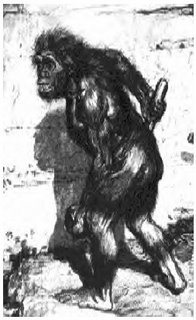
I got the Irish on me, all right.
Actually, that means I speak Gaelic. A more accurate account of my ability might be: Nil moran Gaeilge agam or Tá cupla focail Gaeilge agam.
Either way, I have some Irish.
I began studying Gaelic in my drive to be the most obsessive researcher in the history of writing.
I had an idea for a story set in Ireland and while I was reading old Irish literature for background, I came across a snarky comment by some ancient translator along the lines of -- you can’t believe anything in Gaelic because they’re all a bunch of liars. I thought, to better understand Ireland, maybe I should learn Gaelic.
Which is kind of like thinking, I wonder what’s the name of that star; maybe I should fly to the moon.
I signed up for a night class at the local college and for one semester had conjugated prepositions and simple conversations pounded into my head by a Native Son of the Old Sod. By semester’s end, Tá cupla focail Gaeilge agam.
But when that teacher moved away for a better position at a bigger college, my Gaelic education was reduced to finding phrases and translations on the Net. Which can be interesting, but the phrases were never the ones I thought might come in handy.
Like –
Do you have Guinness on tap?
Then I decided I’d read something originally written in Gaelic, and learn by reading which is how I learned everything else. For this little project I chose, An Béal Bocht by Flann O’Brien. He’s hysterical in both languages and I’m insane. I needed something at the level of See Spot Run and ended up with great Irish satire. Lucky for me and the rest of the non-Gaelic speaking world, all of O’Brien’s work is available in English. (One reviewer commented that An Béal Bocht was written in Gaelic just to be contrary.)
Last weekend, I attended an Irish language immersion weekend with teachers supplied by these folks sponsored by the Montana Gaelic Society. I learned some grammar rules, more phrases (still, alas, not Do you have Guinness on tap) and traveled back in time.
The workshop was held in a Catholic elementary school. As I walked into the Girl’s Room, I felt the strangest sensation. Not déjà vu exactly or fragment of memory but – I was there. I am here. I’m still there. There is still with me.
The good Sisters of my earliest education seemed to brush by me. I could almost hear the swish of habits. The clunk of those thick shoes. Their gentle but dogmatic insistence I learn my prayers. How much of me formed then? What they taught, what I decided, my earliest rebellion rushed back to me in the moment I stood transfixed in the doorway of the fifth grade girl’s bathroom. Time is a funny old concept.
Not all of the Gaelic students last weekend were Catholic, but enough were that there existed the camaraderie of shared experience. We went to different schools together. Each person’s unique story, bound with common experiences, made for an interesting and comforting community.
Which is what language does in the first place.
Or, as anthropologists believe, we didn’t get together until one of us said, “Hey you!”
 In the meantime,
In the meantime,Ar mhaith leat beori.
Conas a déarfá Do you have Guinness on tap as Gaeilge?
Slainte.

Foclóir -- Vocabulary
Nil moran Gaeilge agam – I don’t have much Irish.
Tá cupla focail Gaeilge agam – I have a couple of words of Irish.
An Béal Bocht – The Poor Mouth.
Ar mhaith leat beori – I want a beer.
Conas a déarfá -- as Gaeilge? – How do you say - in Irish?
Slainte – health.

what is An Béal Bocht about? i want to learn gaelic now. what was your earliest rebellion? too bad there arent any irish speaking bartenders around here that would understand 'i want a guinness' or 'i want a irish car bomb', but i want to learn french and italian cuz thats where they find all of the interesting paleo stuff. i learned today that the celts sacked rome in about 307bc (i think thats the year) and it wasnt sacked again for 800 YEARS. :D
ReplyDeleteA real writer, with a true comic spirit.
ReplyDelete— James Joyce
he said that about flann O'brien, i want to read his books now too, i got 'the grass harp' by capote at the library today. i hope it doesnt make me cry for days, i dont really know what its about. i cant bring myself to finish 'tender is the night' because its so good, so far rosemary reminds me of myself sometimes. i havent finished dorian gray either because its so good.
what else did james joyce write that was good but not finnegans wake. ;) is the dubliners good?
If you start reading the Irish writers, your heart will be broken for sure.
ReplyDeleteBut, O'Brien is funny and tragic.
The Poor Mouth "...relates the story of Bonaparte O'Coonassa, born in a cabin in a fictious village called Corkadoragha (Corkadorka) in western Ireland equally renowned for its beauty and the abject poverty of its residents."
The Third Policeman is about the nature of reality and even LOST referenced it as a hint to what the heck is going on there.
Hi. I want to read that book The poor mouth, with O'Coonassa in corkadorka. Do you have it? I'm already laughing. Sounds like a whole new field of reading.
ReplyDelete